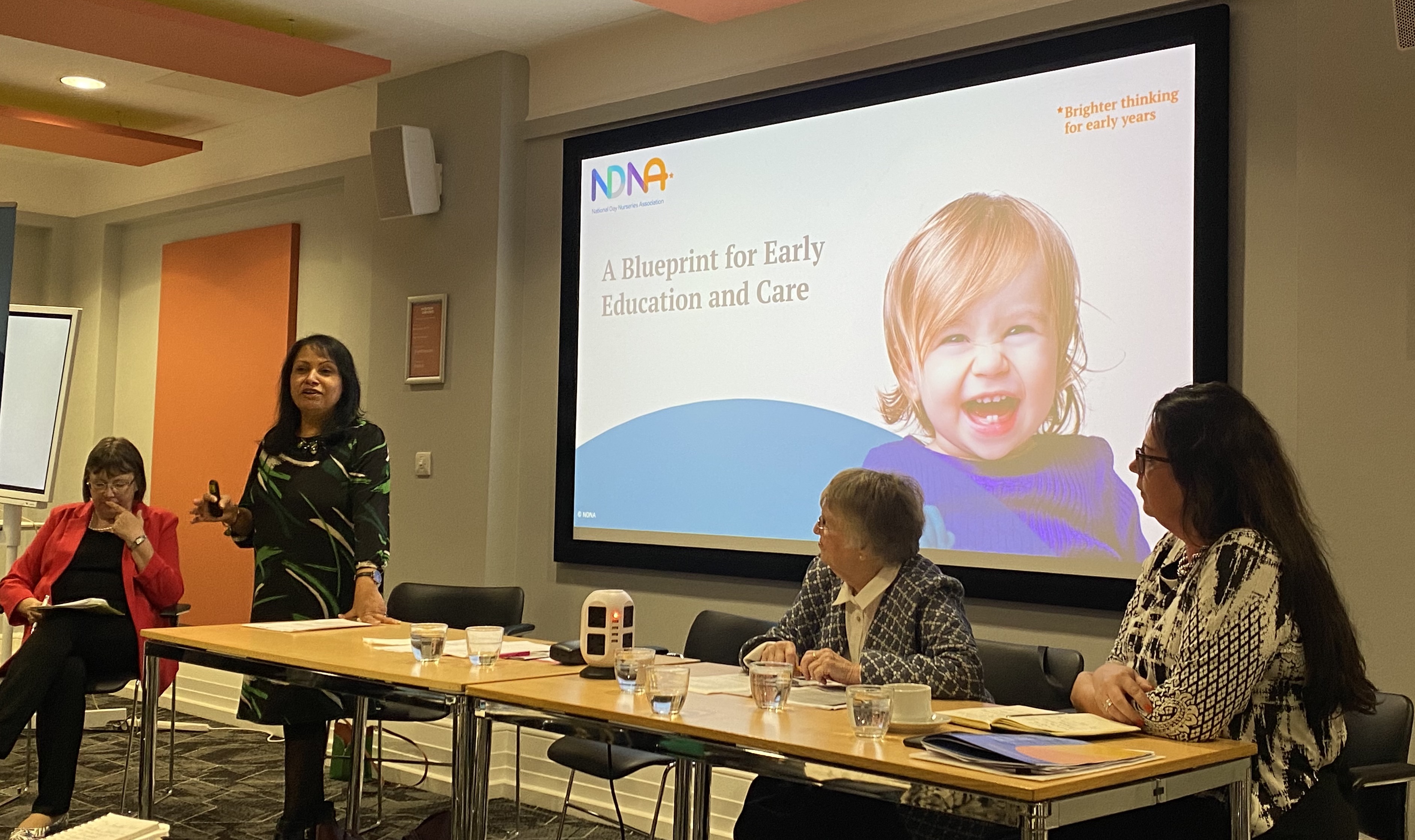
The IoEYE, will be launched fully in 2024 when the NDNA turns 25, and will be a professional membership body for individuals working or aspiring to work, in the early education and care sector.
Chief executive Purnima Tanuku said the institute would be NDNA’s ‘legacy’. She stressed that it would be self-sustaining, not funded by any government, and act ‘an independent voice for the workforce’.
Making the announcement on Tuesday, Tanuku said, that years of research, consultation and focus groups have contributed to the development of the body.
‘Last year we trained 32, 000 people, we’re one of the largest training providers in early years education and childcare,' she said.
‘This is a huge step forward for NDNA. We’re powering this. It will be an independent body that will stand on its own feet and most importantly an advisory body. This is introducing the concept. It’s our 25th birthday next year and we became a charity in 1999.
‘It’s really about providing solutions, we can’t wait for governments and politicians to address [these issues], we need to take control of our own destiny. The sector needs to lead itself and what the institute will do is to help and support them along that way.’
Tanuku said the institute would be a collaborative approach.
Noting that ‘we’ve seen initiatives come and go’ –citing the Children’s Workforce Development Council, which was closed by the Cameron government – Tanuku said, ‘We’re 100 per cent sure that the institute will be self-sustainable’ and not funded by government, ‘an independent voice for the workforce’.
Jane Heywood, NDNA vice-chair and former CEO of the CWDC, added that ‘the NDNA board has put NDNA’s own funding into this, so that it won’t rely on government funding.’
The announcement was made at the launch of the NDNA’s Blueprint for Early Education and Care, at the Wellcome Collection in London on Tuesday, with an expert panel including Professor Kathy Sylva, Department of Education, University of Oxford and Courteney Donaldson, managing director childcare and education, Christie & Co.
Both had chaired roundtable events which contributed to developing the blueprint document.
Professor Sylva said, 'Quality depends first and foremost on the workforce.' She emphasised that the sector needed more money to pay for leadership and for staff training, over and above funding for nursery places. 'It's not just the hourly rate that has to go up, it's the whole system.'
Donaldson, who had chaired the infrastructure round table, said that it was 'a critical time' for many nurseries, particularly smaller settings that were at greater risk.
She said that 'the workforce challenge has become more acute' and she knew of operators that limited capacity even when they had demand for places, because they don't have the staff.
She said that 'no two nurseries were the same' and that the needs for a 30-place term-time nursery on a school site were completely different from a 120-place purpose-built nursery.
Donaldson, who wrote the foreword to the blueprint said it 'provides a comprehensive roadmap, and the beginning of solutions for transforming early education and care' and 'offers ministers and policymakers an opportunity to collaborate in forming a strategy that looks past the election cycle'.

From left: Jane Heywood, NDNA vice-chair, Purnima Tanuku, NDNA chief executive, Professor Kathy Sylva of Oxford University, and Courteney Donaldson of Christie & Co
The blueprint includes 10 key recommendations developed by experts and representatives who took part in roundtable discussions to develop the document, which NDNA hopes will be ‘a game changer’ for future policy, ahead of the general election.
Tanuku said, ‘Successive governments have tinkered with the existing policy, adding more and more funded hours as bolt-ons rather than returning to the drawing board to see how they would work in practice. In doing so, they have exacerbated existing problems which has led to many nurseries and childminders being forced to close their doors.
‘Ultimately, early education and childcare policy – which is currently at the top of all political parties’ agendas - must work for children and families, but also for all types of providers.’
NDNA’s 10 recommendations
- Launch a national commission into the future of early education and care
- Create a new policy framework that is ‘child centric’
- Use the term ‘early education and care’ rather than ‘childcare’ and introducing child development to the National Curriculum
- Create a comprehensive national dataset, encompassing education, health and social care for all children, to enable an indivalised, consistent and holistic approach to child development
- An independent annual review into the cost of delivering high quality early education and care
- Implement a system of universal, fully funded early education and care provision that supports all children, families and working parents
- Remove Business Rates from all early education and care settings
- Create a sustainable workforce strategy for the early education and care sector to build resilience and provide professionals with the training and respect they deserve
- Revise early education and care qualifications to ensure that these adequately address the specific needs of children with Special Educational Needs and Disabilities
- Develop a regulatory system for the early education and care sector that is proportionate, effective and fit for purpose.
- Download the Blueprint for Early Education and Care at www.ndna.org.uk/blueprint
- To register interest in the IoEYE membership and receive updates on the development of the IoEYE, register at https://ioeye-comingsoon.org.uk/









